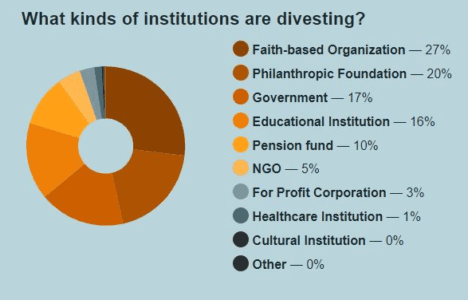
From 2017 Divestment Year In Review: Global Catholic Climate Movement
In March, 2019 – Denver Mayor Michael Hancock announced that the City had begun divesting its General Fund from fossil fuels. Read the press release and learn more about fossil fuel divestment here.
In April, 2017, Denver issued Proclamation No 17-0452 reaffirming our City’s commitment to planet-friendly policies including reducing the generation of greenhouse gases, an increased commitment to sustainability policies, and a shift to renewable energy resources. As part of that commitment, we are asking that the City put its money where its words are and commit to fossil fuel divestment.
Would you support divestment of City holdings in any lending institution or company engaged in the ownership, financing, extraction, production, refining, processing, distribution, and/or direct sales of fossil fuels? Would you support an amendment to the City’s investment policy to ensure that the City will make its best efforts to ensure that it does not participate in an ownership, financing or capital-providing capacity with such entities?
Learn more and join 350 Colorado’s Go Fossil-Free: Divest Invest Committee?
FAQs
How does this affect the City’s fiduciary responsibility?
Divestment does not represent a breach of fiduciary duty. Investment returns of portfolios that divest from fossil fuels and utilities exhibit higher risk-adjusted long-term returns. (Henriques and Sadorsky 2017) https://www.researchgate.net/publication/320698466_Investor_implications_of_divesting_from_fossil_fuels
How much money does the City have in fossil fuel credit holdings?*
As of September 2018, Exxon Mobil Corp was at the top of corporate credit holdings ($113,408.384) and JPMorgan Chase & Co was third at $90,994,693. Holdings with Chevron totaled $65,000,000. This amount changes quarterly. To see the most current holdings go to the Transparent Denver website.
See: https://www.denvergov.org/content/dam/denvergov/Portals/344/documents/transparency/Investment_Portfolio_Performance.pdf
*Credit holding includes commercial paper, asset-backed securities, and corporate bonds.
How would this affect City finances?
Most of the City’s holdings are with US Agencies (22%), US Treasury (43%). Less than 15% of the City’s holding are in corporations and commercial paper and less than 3% would be currently affected by divestment. That change can easily be absorbed by increasing holdings with other issuers or finding new ones.
What about the City’s banking contract with JP Morgan Chase?
We realize that there are currently no financial institutions large enough to meet the City’s banking needs that would meet the criteria of fossil fuel-free. We are not asking the City to cancel its banking contract. Want to join more conversations about fossil fuel divestment? Join our Divest Invest Committee.
Why are banks included in a divestment strategy?
JPMorgan Chase Bank, N.A. and Wells Fargo Bank have been major lenders for financing pipelines including the Dakota Access Pipeline and Keystone XL Pipeline. These pipelines have been highly controversial and both put at risk vulnerable water sources and infringe on indigenous land and rights. Fighting for climate justice must include a divestment strategy targeting banks/lenders.
What are Denver’s current investment restrictions?
As per section P of the City and County of Denver Department of Finance—Cash, Risk & Capital Funding investment policy the City may not participate in an “ownership, financing or capital-providing capacity with entities that:
- Directly or indirectly participate in or support activities that do not have respect for human rights around the world: or
- Are conducting business with a terrorist-sponsoring State.”
Our divestment proposal would add a third restriction.
Who would decide where the City does or doesn’t invest money?
The City’s investment advisers and the Chief Financial Officer would be responsible for screening investments to assure compliance. Let’s stop fracking Colorado as well as supporting investments in fossil fuel projects around the world.

